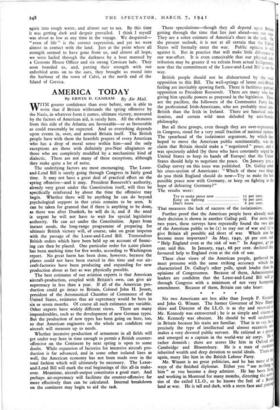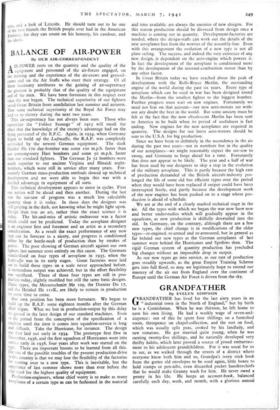AMERICA TODAY
By ERWIN D. CANHAM By Air Mail.
WITH greater confidence than ever before, one is able to write that if Britain withstands the spring offensive by the Nazis, in whatever form it comes, ultimate victory, measured by the factors of American aid, is surely hers. All the elements from this side of the Atlantic are favourable—or as favourable as could reasonably be expected. And so everything depends upon events in, over, and around Britain itself. The British people have with them the heartfelt prayers of every American who has a drop of moral sense within him—and the only exceptions are those with definitely pro-Nazi allegiances or those who are completely muddled by a mechanistic kind of dialectic. There are not many of these exceptions, although they make quite a lot of noise.
The underlying factors are most encouraging. The Lease- and-Lend Bill is surely going through Congress in fairly good time. It may not have a great deal of practical effect on the spring offensive—and it may. President Roosevelt's authority, already very great under the Constitution itself, will thus be specifically reinforced by about the time the offensive may begin. Whether there will be anything he can do beyond psychological support in that crisis remains to be seen. It can be taken for granted that if there is anything to be done, as there was after Dunkirk, he will do it, and if the need is urgent he will not have to wait for special legislative authority. He can act under the Constitution. Apart from instant needs, the long-range programme of preparing for ultimate British victory will, of course, take on great impetus with the passage of the Lease-and-Lend Bill. Tremendous British orders which have been held up on account of financ- ing can then be placed. One particular order for 2,000 planes has been marking time for five weeks, according to Washington report. No great harm has been done, however, because the planes could not have been started in this time and our air- craft-factories have been producing and expanding for new production about as fast as was physically possible.
The best estimates of our aviation experts is that American aircraft-production, coupled with Britain's own, can give air supremacy in less than a year. If all of the American pro- duction could go intact to Britain, Colonel John H. Jouett, president of the Aeronautical Chamber of Commerce of the United States, estimates that air supremacy would be hers in six or seven months. Of course all such estimates are variable. Other experts have widely different views. There are many imponderables, such as the development of new German types. But the production of new types has been going on here, too, so that American engineers on the whole are confident our aircraft will measure up to needs.
Whether intensive production of armament in all fields will get under way here in time enough to permit a British counter- offensive on the Continent by next spring is open to some doubt. While expansion of factories for intensive aircraft pro- duction is far advanced, and in some other isolated lines as well, the American economy has not been made over in the total fashion which will ultimately be necessary. The Lease- and-Lend Bill will mark the real beginnings of this all-in make- over. Meantime, aircraft-output constitutes a good start. And perhaps air-supremacy will facilitate the counter-offensive far more effectively than can be calculated. Internal breakdown on the continent may begin to aid the task. These speculations—though they all depend upon Britain getting through the time that lies just ahead—ore not vain. They are a sober estimate of America's share in the task. on the present outlook, it is not at all certain that the united States will formally enter the war. Public opinion is Kin against it. But in practice that will make little difference to our war-effort. It is even conceivable that our physical con- tribution may be greater if we refrain from actual belligerency, now that the commitment of the Lease-and-Lend Bill is on way.
British people should not be disheartened by the vocal opposition to this Bill. The well-springs of latent anti-Bfitish feeling are inevitably spewing forth. There is factitious partisan opposition to President Roosevelt. There are many who fear giving him specific powers as proposed in the legislation. There are the pacifists, the followers of the Communist Party line, the professional Irish-Americans, who are probably more anti- British than the Irish in Ireland. There are fanatical isola- tionists, and certain wild men deluded by anti-Semitic philosophy.
But all these groups, even though they are over-represented in Congress, stand for a very small fraction of national opinion. The spearhead of the isolationist argument, by which they hoped to move the American public sentimentally, was the claim that Britain should make a " negotiated" peace, and it was speciously added (by those who have constantly urged the United States to keep its hands off Europe) that the United States should help to negotiate the peace. On January 3ist,a Gallup survey on this issue was published. Dr. Gallup asked his cross-section of Americans: "Which of these two things do you think England should do now—Try to make the best possible peace now with Germany, or keep on fighting in the hope of defeating Germany?"
The results were:
Try to make peace now 15 per cent.
Keep on fighting 79 per cent Don't know 6 per cent.
That measures the lack of success of the isolationists.
Further proof that the American people have already made their decision is shown in another Gallup poll. For more than two years, these surveys have repeatedly found the two aim of the American public to be (i) to stay out of war and (2) to give Britain all possible aid short of war. Which aim has become more important? May, 1940, 36 per cent. said "Help England even at the risk of war." In August, 47 p cent. said this. In January, 1941, 68 per cent. declared they favoured help to England even at the risk of war.
These clear views of the American people, gathered one must presume with the same striking accuracy which has characterised Dr. Gallup's other polls, speak louder than the opinions of Congressmen. Because of them, Administratio leaders are confident that the Lease-and-Lend Bill will through Congress with a minimum of not very hampetin! amendment. Because of them, Britain can take heart.
No two Americans are less alike than Joseph P. Kerai0 and John G. Winant. The former Governor of New Ham? shire and Director of the I.L.O. is as shy and reserved s. Mr. Kennedy was extroverted ; he is as simple and sincere s Mr. Kennedy was obscure. He should be well understool in Britain because his traits are familiar. That is to say. he "s precisely the type of intellectual and almost eccentric .whe makes a very devoted public servant. He enlisted as a prica% and emerged as a captain in the world-war air corps. He Is, rather donnish ; there are scores like him in Oxford 01' Cambridge and Bloomsbury. He is a man of moderate inherited wealth and deep devotion to social ideals. There are. again, many like him in the British Labour Party. Mr. Winant is no great politician, and he has none of tt! ways of the finished diplomat. Either you "see nothing.° him" or you become a deep admirer. He has been IA,. and working in Montreal for many months, directing the acr, ties of the exiled I.L.O., so he knows the feel of a Br1! land at war. He is tall and dark, with a stern face and Pier° eves, and a look of Lincoln. He should turn out to be one oi the best friends the British people ever had in the American Embassy. for they can count on his honesty, his candour, and his ideals.































 Previous page
Previous page